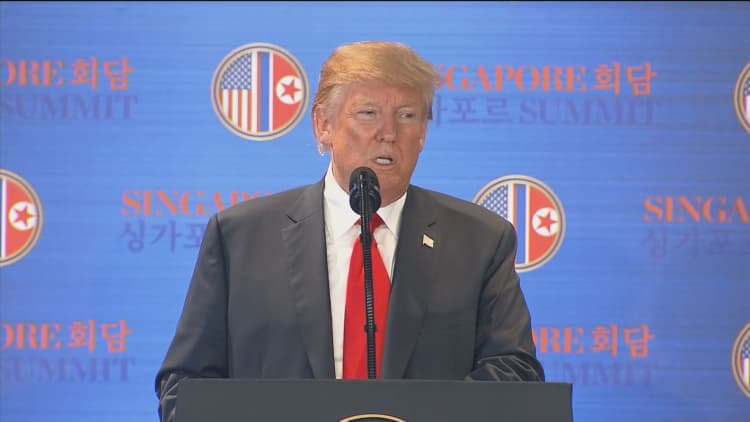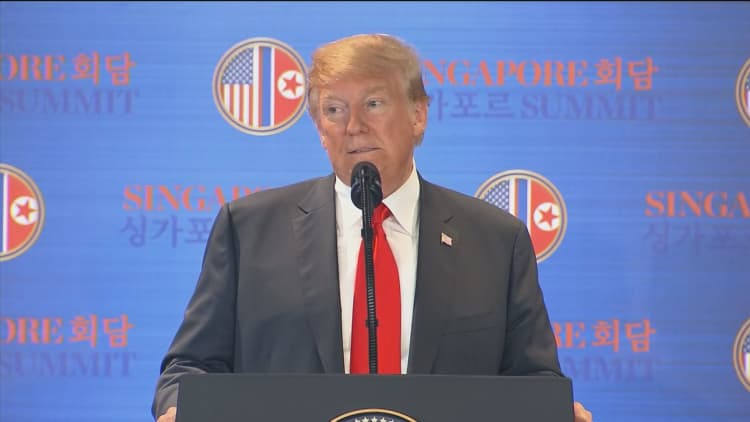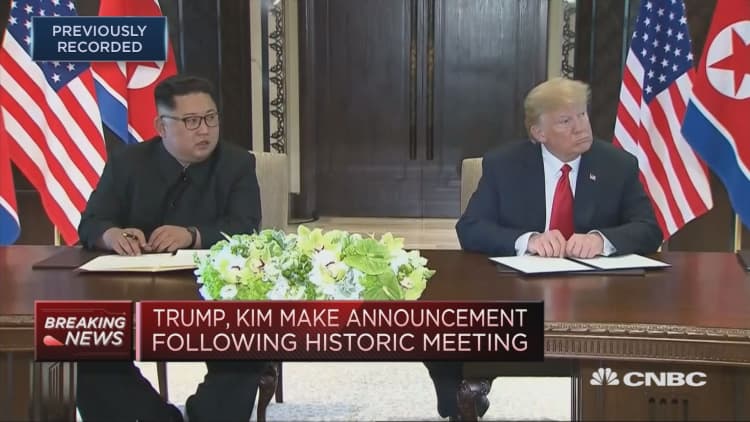
The Korean conflict "will soon end," President Donald Trump said Tuesday following a historic summit with North Korean leader Kim Jong Un.
"Adversaries can indeed become friends," Trump said.
At the end of their historic meeting at the luxury Capella hotel on Singapore's Sentosa island, the first ever between leaders of the two nations, Trump and Kim signed an agreement to work toward complete denuclearization and a lasting "peace regime" on the Korean peninsula.
The document, which Trump deemed "very comprehensive," says the two sides commit to hold follow-up negotiations and to cooperate to develop bilateral relations.
Asked about what the agreement meant for North Korea's denuclearization, Trump said "we're starting that process very quickly — very, very quickly."
There was no mention of sanctions in the document, but Trump said after the summit those penalties on Pyongyang would remain in place until "the menace of nuclear weapons" is removed.
He also fended off questions about dealing with a dictator of a brutal regime in which dissent is not tolerated and opponents are killed.
"I think he liked me and I like him," Trump told Voice of America's Greta Van Susteren in an interview. "And I understand the past and, you know, nobody has to tell me, he's a rough guy. He has to be a rough guy or he has been a rough person. But we got along very well. He's smart, loves his people, he loves his country. He wants a lot of good things and that's why he's doing this."
Pressed by Van Susteren about human rights abuses, Trump said: "Look, he's doing what he's seen done, if you look at it. But, I really have to go by today and by yesterday and by a couple of weeks ago because that's really when this whole thing started. "
A photo of the document Trump signed revealed that the leaders of the United States and the Democratic People's Republic of Korea agreed on these four points:
1. The United States and the DPRK commit to establish new U.S.-DPRK relations in accordance with the desire of the peoples of the two countries for peace and prosperity.
2. The United States and the DPRK will join their efforts to build a lasting and stable peace regime on the Korean Peninsula.
3. Reaffirming the April 27, 2018 Panmunjom Declaration, the DPRK commits to work toward complete denuclearization of the Korean Peninsula.
4. The United States and the DPRK commit to recovering POW/MIA remains, including the immediate repatriation of those already identified.
Read the full text of the document here.
In addition to those elements, the document says Trump "committed to provide security guarantees" to North Korea, an apparent reference to the authoritarian government's longstanding concern that the ultimate American goal is regime change in Pyongyang.
To follow up on the agreement, Secretary of State Mike Pompeo, national security advisor John Bolton and other members of the U.S. team will be "getting together" with North Korean officials next week to work out details of their agreement, Trump said. He added that he and Kim will "probably" need another meeting, but one hasn't been set.
"Mike, our whole team has to get to work and get it completed because, otherwise, we've done a good job, but if you don't get the ball over the goal line, it doesn't mean enough," Trump told his secretary of State at the conclusion of Tuesday's news conference.
No more war games
Trump also announced that the United States will be stopping the war games it conducts with South Korea.
Doing so "will save us a tremendous amount of money — unless and until we see that the future negotiation is not going along like it should," Trump told reporters. "Plus I think it's very provocative."
He also took a dig at South Korea, implying that the U.S. ally doesn't pay enough for those exercises: "That's certainly a subject that we have to talk to them about."
Seoul's presidential office told The Associated Press it was trying to discern the exact meaning and intent of Trump's comments.
The president said he would eventually like to see the full withdrawal of U.S. troops from the Korean peninsula. Still, Trump emphasized during his postsummit press conference that the U.S. had not yet agreed to reduce any military capabilities: "We're not reducing anything."

"I think our whole relationship with North Korea and the Korean peninsula is going to be a very much different situation than it has in the past. We both want to do something, we both are going to do something, and we have developed a very special bond," Trump said at the signing ceremony. "This is going to lead to more and more and more."
Many experts expressed dismay at the agreement, however. Beatrice Fihn, executive director at the International Campaign to Abolish Nuclear Weapons — a civil society coalition that was awarded the 2017 Nobel Peace Prize — said on Twitter the agreement is flawed because Kim did not explicitly agree to nuclear disarmament.
"[T]his all looked more like a big welcome party to the nuclear-armed club," she said.
Vipin Narang, an MIT expert focusing on nuclear proliferation and strategy, tweeted that the U.S. guarantee of security and North Korea's pledge to work toward denuclearization were "a vague meaningless pledge in exchange for a vague meaningless guarantee."
Trump repeatedly insisted during his news conference, however, that North Korea would make real and meaningful moves toward denuclearization.
"You can't ensure anything. All I can say is they want to make a deal," Trump said in response to a question about whether North Korea could be "all talk, no action."
"I just feel very strongly, my instinct, my ability or talent, they want to make a deal," he said.
"I think he's going to do these things. I may be wrong, I mean, I may stand before you in six months and say, 'Hey I was wrong," Trump said of Kim. "I don't know that I'll ever admit that, but I'll find some kind of an excuse."
China, North Korea's longtime patron, took a decidedly positive tone on the agreement. The fact that both leaders can sit together and converse has significant meaning and creates new history, Chinese Foreign Minister Wang Yi told reporters, according to Chinese news media.
'Very worthy, very smart'
After the signing of the document, Trump declared to the assembled media at the summit that Kim was a "very worthy, very smart negotiator."
"We had a terrific day and we learned a lot about each other and about our countries," Trump said, standing shoulder-to-shoulder with the North Korean dictator. "I learned he's a very talented man. I also learned he loves his country very much."
That comment from Trump elicited a question during his postsummit press conference North Korea's brutal rule, including the killings of Kim's uncle and half-brother.
"He is very talented: Anybody that takes over a situation like he did at 26 years of age and is able to run it and run it tough — I don't say he was nice," the president said.
Trump has appeared largely unconcerned about the implications of feting an authoritarian leader suspected of ordering the public assassination of his half-brother with a nerve agent, executing his uncle by firing squad and killing U.S. college student Otto Warmbier.
But without Warmbier's death, the meeting with Kim may not have happened, Trump said: "Otto did not die in vain."
The U.S. president said human rights did come up during the talks, albeit briefly.

The summit began with the two men briefly shaking hands and taking a photo side by side, then moving to another room, where they sat and made brief statements for the press.
"We're going to have a great discussion and, I think, tremendous success. It will be tremendously successful. And it's my honor," Trump said.
"We will have a terrific relationship — I have no doubt," the president added.
Kim said: "It was not easy to get here. The past worked as fetters on our limbs, and the old prejudices and practices worked as obstacles on our way forward. But we overcame all of them, and we are here today," according to a translation provided by the White House.
Trump responded: "That's true."
Following those comments, the two leaders began what was said to be a one-on-one meeting, with only translators in attendance.
They then made a brief appearance together at a balcony exposed to cameras, and then headed into a larger bilateral meeting. With delegation members on opposing sides of the table, Trump delivered another message to Kim.
"Mr. Chairman, it's a great honor to be with you, and I know we'll have tremendous success together and we'll solve a big problem — a big dilemma — that until this point has been unable to be solved, and working together we'll get it taken care of," Trump said before reaching for another handshake with his North Korean counterpart.
After hearing Kim's response, Trump added: "We will solve it, we will be successful, and I look forward to working on it with you. It will be done."
Later in the day, the two men walked out of the meeting together, and Trump addressed the media.
"It's going great. We had a really fantastic meeting, a lot of progress, really very positive. I think better than anybody could have expected — top of the line, really good," the president said.
First such meeting in history
It was the first time that leaders of the countries have met, and it came after years of bluster and threats from Pyongyang — and from Trump — that have raised fears of nuclear annihilation.
Many analysts have argued that any recent U.S. leader who had wanted to meet with Kim or his father before him could have done so, because North Korea sought the legitimization of such an event.
Trump gave Kim's regime that opportunity, but the U.S. team also said it is resolute in its goal for Tuesday's summit: North Korea's total and verifiable denuclearization.
American officials have dangled relief from stringent international sanctions or even economic aid if the hermit regime were to acquiesce. Beyond those benefits, North Korea was understood to want guarantees about the future of its autocratic regime and the security of its borders.
Washington has hoped the bilateral discussions would be the first of many with Kim's government, eventually leading to the country surrendering its nuclear capabilities. That weapons program has become a threat to neighbors South Korea and Japan — and more recently, even for the U.S. mainland.
For decades, Pyongyang has sought to depict the United States as an imperialist aggressor for its role in the Korean War, while simultaneously blaming Washington for North Korea's dire economic condition.
The isolated country has long said it's justified in seeking nuclear weapons in light of an "extreme and direct nuclear threat" from the United States.
Tuesday's meeting was seen as a diplomatic breakthrough, even if some experts have said the summit is a strategic mistake on Washington's part, since it allows Kim to appear as an equal to Trump.

Trump addressed that argument in his postsummit news conference, saying "I gave up nothing, I'm here: I haven't slept in 25 hours, but I thought it was appropriate to do because we have been negotiating literally around the clock."
"We haven't given up anything other than, you're right, I agreed to meet," he said in response to a reporter's question. "And I think the meeting was every bit as good for the United States as it was for North Korea."
"It's not a big deal to meet," he added.
What was expected?
Experts had predicted little in terms of concrete results from the summit. In the past, Pyongyang has said it may denuclearize only if certain conditions were fulfilled. Those include terminating America's military presence in South Korea as well as ending the U.S. regional nuclear umbrella, a security arrangement in which Washington promises in-kind retaliation on behalf of close allies if they are attacked with nuclear weapons.
Washington had said its troops in South Korea would not be up for discussion during the Tuesday summit. Such a withdrawal could have major implications for Asia.
While a failure to reach any deal would have posed risks, so does reaching an agreement.
"The greatest risk is if we get a political agreement at this summit, and the optics look nice, but then it falls apart on the details — maybe not in six months, maybe not in one year, but in five years," Michael Kovrig, senior advisor at the International Crisis Group, told CNBC on Monday.
"That's why we need a clear, step-by-step process that goes action-for-action [and] creates a security environment where the North Koreans are actually willing to take steps, and the United States is in a position to monitor and verify those steps."
—CNBC's Nyshka Chandran, Reuters and The Associated Press contributed to this report.


